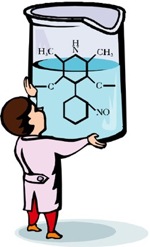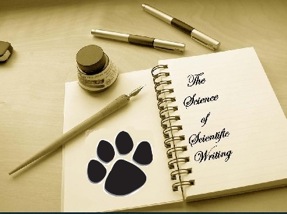of Scientific Writing |
OVERVIEW: The way to well-written science
PART I: Paragraphs and Sentences
SET A: Paragraphs: The Maps Behind Them
SET B: Paragraphs: Using Maps to Meet Readers' Expectations
SET C: Paragraph Coherence and Cohesion
SET D: Sentences
SET E: Scientific Sections (including Methods)
SET F: Scientific Sections: The Discussion
SET G : Scientific Sections: The Introduction
SET H : The Paper as a Whole
There is more to writing science than writing
 Most scientists love to watch the world at work, to suggest how it works, and to test those ideas with experiments. These activities capture the essence of being a scientist. Few scientists however get very excited about writing up their research, and some are entirely intimidated by the prospect. Writing is usually seen as a necessary evil, to be got out of the way as quickly as possible, so one can get back to the real science of observation and experimentation.
Most scientists love to watch the world at work, to suggest how it works, and to test those ideas with experiments. These activities capture the essence of being a scientist. Few scientists however get very excited about writing up their research, and some are entirely intimidated by the prospect. Writing is usually seen as a necessary evil, to be got out of the way as quickly as possible, so one can get back to the real science of observation and experimentation.
However, trying to rush the writing phase of research seldom works. In the most exteme case, it can lead those collaborating on a paper into a dispiriting downward spiral of repeated revision, each turn of the cycle leaving them more panicked and the paper ever less lucid. Even when it does not get this bad, writing a paper often feels a very inefficient and haphazard process.
Why is it like this? It is my belief that it is the very emphasis on writing that is the root cause of the problem! If we imagine the partnership of a graduate student and supervisor as a typical writing team, then a draft paper is sadly often the focus of their first serious discussion about the paper. For both partners, a draft actually represents too big a jump in the development of the text. Proceeding like this is as crazy as if, in a rush to build a new house, you immmediately went out and started laying bricks and mortar in a paddock, hoping that somehow this would bring to life the vision in your head. A more sensible plan would be to discuss a blueprint of the house with an architect, and to have procedures in place to monitor the ongoing progress. It is much harder to check the foundations once the house is half-finished!
The typical paper-production process currently lacks an established set of intermediate "waypoints" that could serve as the writing equivalents of the "blueprints" and "quality monitoring procedures" used in the building world. The aim of this course is to introduce you to the approaches that I have found most useful in my twelve years of experience as a teacher of scientific writing. In my work, I have found myself focusing increasingly on the efficiency of collaborative writing, because every student exercise for which I provide feedback is, in essence, a team effort. I hope that the deconstructive strategies that have helped make all my mini-collaborations more rewarding will allow your writing team to avoid the wasted effort that so often results from a precipitous push to publish.
Over the next eight or so pages the Introduction Section will explain the general principles behind the system used in this course. While it is useful to have this background, it not absolutely necessary, so if you are the type of person who can't wait to get down to "experiments", you can skip straight to the exercises.

About The Developer
Dr Geoff Hyde's academic CV can be downloaded here. Briefly: I was engaged in scientific research (as a cell biologist) and university teaching for 16 years, before switching to a full-time career as a teacher of scientific communication skills at NCBS Bangalore in 2004. In the decade before coming to India, I had also run many workshops and courses on scientific writing at the University of New South Wales, and other universities, in Sydney, Australia.
About This Version of the Course
This course is usually revised extensively twice a year, and each edition is basically a "work in progress". Older editions are however retained on the server. Check back here in June 2010 for a link to the new edition, which promises to have some exciting developments! You are encouraged to tell as many people about the course as possible.
Contact:
Dr Geoff Hyde
geoff@ncbs.res.in
National Centre for Biological Sciences
Bellary Rd, GKVK Campus
Bangalore 560-065
Office: 080 2366 6412
Cell: 944 9816 495
Last updated: Nov 2009 ![]()
......
 The Science
The Science